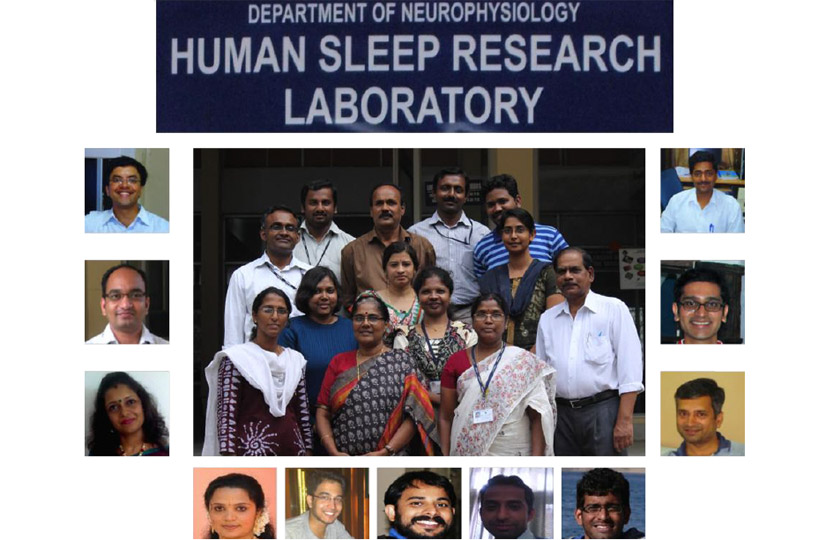The Human Sleep Research Laboratory, Department of Neurophysiology, NIMHANS, Bangalore has been established in the year 2000 with a vision of undertaking sleep research: to understand the neurophysiology of sleep in health and disease; towards manpower development in the area of sleep research; to provide short term and long term training in the area of human sleep; to establish academia-industry collaborations to develop software as well as hardware for polysomnography studies, analysis of sleep EEG, etc.
So far we have completed three Govt. funded research projects on polysomnography, completed 4 Ph.D, 2M.Phil Dissertations and 2 MD Theses in Psychiatry. Currently 1 Ph.D, 2 M.Phil dissertations and 2 D.M. dissertations and one Govt. Funded projects are ongoing. More than 5 students trainees from different universities have completed their short term projects towards B.Tech, M.Tech Degrees, and more than 25 students have undergone short term training as a part of M.D. Physiology curriculum by the Rajiv Gandhi University for Health Sciences, Bangalore and also from other states.
We are pioneers in undertaking polysomnographic studies to elucidate the neural correlates of Vipassana meditation from sleeping brain perspective. As it is known that meditative practices condition brain functions at different levels and in different ways, we have undertaken many comprehensive studies to elucidate the influence of Vipassana meditation on sleep organization in the past 15 years. We have demonstrated the distinct changes brought by meditation practices on the macro and micro sleep architecture, how meditation proficiency helps in defying age associated changes in sleep, how meditative practices modulate autonomic functions during sleep to preserve the sympathovagal balance, etc. Currently, we are looking into the influence of meditation proficiency on sleep organization, the electrophysiological correlates of consciousness during sleep associated with meditation, etc.
Our research lends credibility to the proposition that meditative practices are useful tools for bringing about neuroplasticity changes leading to enhanced cognitive reserve capacities. Our ongoing research explores the science of lucid dreaming in proficient meditators as well as induction protocols in healthy controls. Prof. Sunao Uchida, Director Sports Sciences Waseda University collaborates with the meditation studies. Other collaborators include Dr. RavindraPanth , Director, NavanalandaMahavihara University, Patna in the sleep, meditation and consciousness program.
We have undertaken a few collaborative research projects to elucidate the pathophysiology of neuropsychiatricdisorders from sleeping brain perspective and also to look at the possible biomarkers. We have completed two projects on Generalized Anxiety Disorders (GAD) and on Schizophrenia and currently undertaken studies with Spino-Cerebellar Ataxia and Parkinson’s disease. Sleep disturbances are common features of GAD and Schizophrenia and we have demonstrated the efficacy of traditional ayurvedic formulations (ManasamitraVatakam) in establishing sleep quality as well as in preserving the sleep architecture in patients with GAD and co morbid social phobia . We have also showed that ManasamitraVatakamis much more effective in preserving quality sleep than clonazepam treatment though both are potent anxiolytics. We have also demonstrated the abnormalities of sleep cycle dynamics and spindle delta dynamics in patients with recent onset schizophrenia as a window to understand the dysfunctional thalamocortical mechanisms associated with schizophrenia pathophysiology. At present we are looking at the various aspects of macro as well as the micro sleep architecture abnormalities in Spino-Cerebellar Ataxia and Parkinson’s Disease as a means to understand how sleep abnormalities could predict the severity of neurodegeneration and disease progression. These studies are undertaken in collaboration with the department of Psychiatry and Neurology, NIMHANS, especially with Dr. C.R. Chandrasekhar (Professor of Psychiatry), Dr. John P. John (Professor of Psychiatry), Dr. Pramod K. Pal (Professor of Neurology) and Dr. Ravi Yadav (Additional Professor of Neurology). We have planned several more collaborative studies with Institutions other than NIMHANS as per the 12th Five year plan.
In addition, our group has been using suitable animal models for looking into the role of sleep in memory consolidation especially the hippocampal theta activity, thalamocortical functions, cholinergic mechanisms, etc. associated with memory consolidation during sleep, how ventral subicular lesion affects sleep and cognitive functions etc. These are taken up in collaboration with Dr. Laxmi T. Rao ( Addtl. Professor of neurophysiology ) and with M/S. Axxonet systems, Bangalore
We have also initiated an industry–academia network in collaboration with Prof. V. Mohan Kumar, Emeritus Professor, Sree ChitraThirunal Institute of Medical Sciences & Technology, Thiruvanthapuram, Kerala and with M/S Axxonet Systems, Bangalore to further develop software associated with sleep state analysis and to strengthen sleep research in the country. Future studies include undertaking research studies on sleep disorders, neurodegenerative disorders and to look at the feasibility of yoga/meditation and cognitive retraining strategies in alleviating the sleep problems as well as the disorder itself.
As part of our community outreach activities on sleep and sleep disorders, we conduct at least two CMEs/year in medical colleges. Additionally, we have initiated one-day symposium on sleep and mental health awareness program in other IT institutions. We are yet to initiate public awareness programs on sleep in health with an NGO.
Training opportunities in The Human Sleep Research Laboratory, Department of Neurophysiology, NIMHANS, Bangalore
Two weeks training in Neurophysiology for MD Physiology students of Rajiv Gandhi University of Health Sciences. Here the students get 3-4 days of posting in the human sleep research and cognitive lab. We have a definite module of teaching which include: basics in Electronics, Hands on Training on EEG & Polysomnography using Analogue Grass Polygraph, This can be in a day and one night, sleep stages analysis teaching with R& K manual & Recent AASM manual, One demo on the polysomnography system (neurofax from Nihon Kohden) Theory class on sleep, EEG, polysomnography etc, theory classes on ERPs, demonstartion of ERPs, assignments on all these subjects etc and finally an assessment. The students are posted in other labs then.
B.Tech and M.Tech/ M.Sc/ MD Students who come for 3- 6 months project/ dissertation – we provide them basic training like the one mentioned above as well as give them a part of the ongoing study or give them part of the already acquired data for their dissertation/ project work etc.


